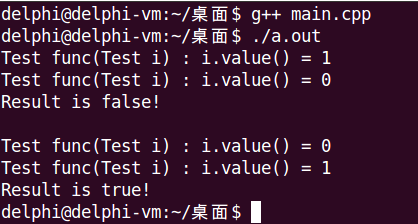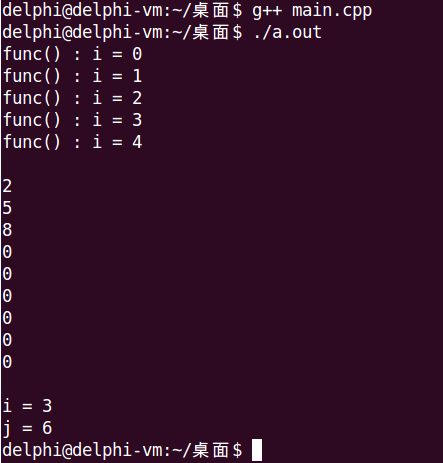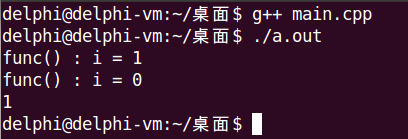操作符重载(三)
1. 结论
前面两次笔记都是C++中可以重载且无副作用的操作符,本次笔记比较特殊,主要列出两个C++语法允许重载、但在工程中不应该(不允许)重载的操作符:
- 逻辑操作符
&&和|| - 逗号操作符
,构成的逗号表达式
这两个操作符在工程中不允许重载的原因是:重载后无法完全实现操作符的原生语义。
2. 逻辑操作符重载
先来回忆一下逻辑操作符的原生语义
- 操作数只有true和false两种值
- 逻辑表达式不需要完全计算就能确定最终结果(短路法则)
- 最终结果也只能是true或者false
C++语法是允许重载逻辑操作符的,看下面的示例代码
#include <iostream>
#include <string>
using namespace std;
class Test
{
int mValue;
public:
Test(int v)
{
mValue = v;
}
int value() const
{
return mValue;
}
};
bool operator && (const Test &l, const Test &r)
{
return l.value() && r.value();
}
bool operator || (const Test &l, const Test &r)
{
return l.value() || r.value();
}
Test func(Test i)
{
cout << "Test func(Test i) : i.value() = " << i.value() << endl;
return i;
}
int main()
{
Test t0(0);
Test t1(1);
/*
* 根据短路法则,期望的正确输出为:
* Test func(Test i) : i.value() = 0
* Result is false!
*/
if( func(t0) && func(t1) )
{
cout << "Result is true!" << endl;
}
else
{
cout << "Result is false!" << endl;
}
cout << endl;
/*
* 根据短路法则,期望的正确输出为:
* Test func(Test i) : i.value() = 1
* Result is true!
*/
if( func(1) || func(0) )
{
cout << "Result is true!" << endl;
}
else
{
cout << "Result is false!" << endl;
}
return 0;
}

代码中注释了我们期待的正确输出,但实际运行结果一个都没对上,为什么呢?
- 操作符重载的本质是通过函数调用扩展操作符的功能,47行和63行的if条件分别等价于
operator && (func(t0), func(t1))和operator || (func(t1), func(t0)) - 重载函数在进入函数体之前必须完成所有参数的计算,而函数参数的计算顺序是不确定的
- 短路法则完全失效,逻辑操作符重载后无法完全实现原生语义
因此,在工程中应当避免重载逻辑操作符,建议采用重载比较操作符或提供成员函数的方式,来代替重载逻辑操作符。
3. 逗号操作符重载
逗号操作符,可以构成逗号表达式,下面是逗号表达式的原生语义
- 逗号表达式用于将多个子表达式连接为一个表达式,如
exp1, exp2, exp3, ... , expN - 逗号表达式中前N-1个子表达式可以没有返回值,最后一个子表达式必须有返回值
- 逗号表达式的最终结果为最后一个子表达式的值
- 逗号表达式严格按照从左向右的顺序计算每个子表达式的值
#include <iostream>
#include <string>
using namespace std;
void func(int i)
{
cout << "func() : i = " << i << endl;
}
int main()
{
int a[3][3] =
{
(0, 1, 2), //逗号表达式,等价于a[3][3] = {2, 5, 8,};
(3, 4, 5),
(6, 7, 8)
};
int i = 0;
int j = 0;
while (i < 5)
func(i), //逗号表达式,等价于func(i), i++;
i++;
cout << endl;
for (i = 0; i < 3; i++)
{
for (j = 0; j < 3; j++)
{
cout << a[i][j] << endl;
}
}
cout << endl;
(i, j) = 6; //逗号表达式,等价于 j = 6;
cout << "i = " << i << endl;
cout << "j = " << j << endl;
return 0;
}

在C++中重载逗号操作符是合法的,重载函数的参数必须有一个是类类型,且重载函数的返回值类型必须是引用
Class &operator , (const Class &a, const Class &b)
{
return const_cast<Class &>(b);
}
看下面的示例代码
#include <iostream>
#include <string>
using namespace std;
class Test
{
int mValue;
public:
Test(int i)
{
mValue = i;
}
int value()
{
return mValue;
}
};
Test &operator , (const Test &a, const Test &b)
{
return const_cast<Test &>(b);
}
Test func(Test &i)
{
cout << "func() : i = " << i.value() << endl;
return i;
}
int main()
{
Test t0(0);
Test t1(1);
/*
* 期望的正确输出为:
* func() : i = 0
* func() : i = 1
* 1
*/
Test tt = (func(t0), func(t1));
cout << tt.value() << endl;
return 0;
}

虽然第44行输出结果和预期相符,但第43行输出和预期不符,原因和逻辑操作符重载一样,都是由函数参数计算顺序的不确定性造成的,也就是说:
- 逗号操作符重载后,构成的逗号表达式无法严格按照从左向右的顺序计算各个子表达式
- 逗号操作符重载后无法完全实现原生语义
- 因此,在工程中不要重载逗号操作符






